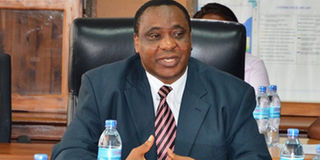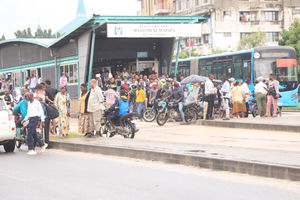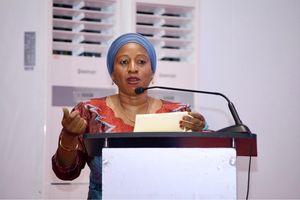JPM sacks Minerals PS amid gold controversy

Prof Justin Ntalikwa
What you need to know:
A brief statement issued by State House said Prof Ntalikwa’s replacement would be announced later. No further details were given. Prof Ntalikwa is the second senior government official to have been sacked by Dr Magufuli in three days following the dismissal last Thursday of the Minister of Information, Arts, Culture and Sports, Mr Nape Nnauye.
Dar es Salaam. President John Magufuli yesterday sacked the Energy and Minerals Permanent Secretary, Prof Justin Ntalikwa.
A brief statement issued by State House said Prof Ntalikwa’s replacement would be announced later. No further details were given. Prof Ntalikwa is the second senior government official to have been sacked by Dr Magufuli in three days following the dismissal last Thursday of the Minister of Information, Arts, Culture and Sports, Mr Nape Nnauye.
Prof Ntalikwa was sacked a few hours after he accompanied a team of MPs, led by Speaker of the National Assembly Job Ndugai, on a visit to Dar es Salaam Port to see for themselves containers of gold and copper concentrate seized at the port over the weekend.
During the visit, Prof Ntalikwa detailed difficulties the government was facing in ensuring that the processing of mineral concentrates was done locally.
Mr Ndugai told reporters during the surprise visit that Parliament was shocked by the seizure of 282 gold ore containers that had already been cleared for export.
Twenty-six containers were impounded during President Magufuli’s visit last Thursday and 256 more were seized at the Kurasini inland container depot near the port.
The containers that had already been cleared by the Tanzania Revenue Authority (TRA) belonged to Buzwagi and Pangea gold mines.
The State House statement gave no reason for Prof Ntalikwa’s removal, but sources in the ministry said it was likely his sacking was linked to his remarks about the cost of establishing a facility for processing gold and copper concentrates, which were in conflict with President Magufuli’s publicly stated reasons for banning the export of the compounds.
Prof Ntalikwa told Mr Ndugai and his team that it was too expensive to establish a processing plant, adding that it could take time before the country was ready to process concentrates locally.
Mr Ndugai announced the formation of a parliamentary team that would seek to establish how Tanzania could benefit more from its mineral wealth.
Yesterday, the acting director general of the Tanzania Ports Authority (TPA), Mr Deusdedit Kakoko, said he had information that gold formed a large part of the ore in the 282 seized containers.
“We have information that a big part of these minerals is gold. It can be up to 90 per cent. It is possible that out of the 282 containers, 254 contain gold. The information I have is that copper forms only eight per cent of this consignment, while only two per cent is silver.”
Yesterday, Prof Ntalikwa said the ministry would appoint a team of experts that would take samples from each container and analyse them to establish the actual mineral content.
He said re-examination of the samples would involve other government agencies and results would be made public.
Prof Ntalikwa told Mr Ndugai and his delegation that reports they had from the Tanzania Minerals Audit Agency (TMAA) was that a big percentage of the ore content was copper.
“That is why TMAA sealed the containers after confirming that what was inside is copper concentrate,” he said.
Yesterday, Mr Ndugai said the National Assembly was concerned about the development and it was decided that the team travel to Dar es Salaam from Dodoma to assess the seriousness of the problem and advise the government accordingly.
“I will consult with lawmakers on whether what will be formed will be an investigative team or a committee. MPs will decide on its structure, powers and terms of references,” he said.
Mr Ndugai, who was accompanied by ten MPs from the Budget and Energy and Minerals committees, said the team would be tasked with scrutinising mining contracts the government has entered into with mining companies and give recommendations on value chains in the mining sector.
He said Parliament would like to identify Tanzanians charged with assessing minerals starting from the source to foreign countries where the ores are exported, saying it was illogical to transport natural resources to Germany, Japan and China without having a system that safeguarded the country’s interests.




